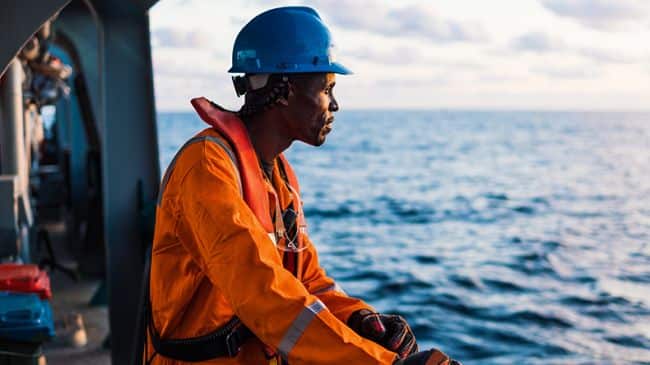
[ad_1]

There is a clear need for a more coordinated approach to supporting seafarers where resources are pooled into a single body that can leverage legal expertise and lobbying power to advocate for the rights of seafarers, according to the newly released Inmarsat-sponsored Thetius drafted report ‘A Fair Future for Seafarers?’.
The sponsored report, produced by maritime technology innovation company Thetius, highlights the suicide of a young seafarer, just 23 years old, to demonstrate how the COVID-19 pandemic has impacted the mental health of many seafarers and put pressure on welfare organisations trying to support them.
“Unfortunately, the COVID-19 pandemic proved that the MLC is not enforceable,” states the report. In the absence of welfare leadership from governments, seafarers have no choice but to rely on charities and NGOs. “2020 showed the collective ineffectiveness of the entire shipping industry, including charities, corporates, unions and even international bodies such as the IMO to act as a voice for the needs of seafarers during a crisis.”

Representation Image – Credits: UN – Twitter
Then there are perennial issues such as fatigue, bullying, abuse, criminalisation, abandonment and piracy which, like pandemics, are likely to continue in the future. The report states that, as a profession, seafaring should not have to rely on the work of charities to function effectively. Rather, these welfare organisations should aim to make themselves redundant by ensuring that seafarers no longer require their services except in exceptional circumstances.
“By representing the entire sector’s views on the international stage, coordinating lobbying for long term funding, and enabling better advocacy activity, a single body that is made up of representatives of the whole welfare sector will be far more effective at creating change than any one welfare charity could be.”
HRAS has considered this proposed view and notably, has previously promoted a similar idea as early as September 2015.
At that time, there was another ongoing maritime crisis occurring. After being arrested in India in 2013, six UK security guards onboard the MV Seaman Guard Ohio were due to stand trial. After protracted legal engagement, an Indian appeals court finally acquitted the 35 crewmembers and security guards in November 2017. Many organisations, notable among them The Mission to Seafarers, provided welfare support alongside then UK Foreign and Commonwealth Office (FCO) background interventions, but even with the weight of national and international opinion supporting them, including European Parliament intervention, the men suffered years of unnecessary incarceration and inhumane treatment in Chennai prison.
The situation was exceptional, but even back then speakers at The Big Welfare Debate – London International Shipping Week 2015, considered how seafarers can be overworked, fatigued, socially isolated and abused and questioned the reality of the implementation of the MLC on welfare provision for seafarers.
At that time, HRAS CEO David Hammond called for unity of effort. “A coordinated approach is urgently needed across the maritime welfare community, as isolated responses and duplication of effort assists nobody. A fragmented approach ultimately affects those very persons who the welfare service providers aim to assist by diluting their individual efforts. Strength is in depth and as such any opportunity for unity should be embraced without exception.”
The Thetius report further promotes the key role that telecommunications will play in supporting seafarers as the industry moves towards smaller crews, less shore leave and greater automation of tasks at sea.
Seafarer and Family Protections
It calls on welfare organisations to consider how they will use digital tools to support seafarers remotely at sea and at the same time calls on them to be more proactive in their support of families ashore. As well as the growth of digitally delivered services, this may require the development of physical support centres in major seafarer population centres such as The Philippines, China and Ukraine. A pivot towards families and communities could enable a more proactive and preventative approach to evolving welfare issues for seafarers themselves.
HRAS also supports the continued need for greater recognition of the importance of families and communities and has worked towards that goal with the release of family impact statements in cases where seafarers have gone missing or been murdered.
The first, published in February 2016, was voluntarily provided by the sister of the 23-year-old Greek Sub-lieutenant, Anastasios Nakis, who went missing at sea in April 2015 on board of bulk carrier MV Ingrid C. Among more recent efforts, HRAS published a case study and family impact report on the missing Third Officer Cristito M. Acosta who disappeared without trace from onboard the MV Jiaolong Spirit though the final outcome, following investigation by the employer, was never publicly released.
As for the on-going funding of the welfare transition it calls for, the Thetius report acknowledges that it might be difficult even though MLC member states should be responsible.
More positively though, the report highlights how successful co-ordinated lobbying led to the New Zealand government amending its Maritime Transport Act 1994 to fund seafarer centres through the Minister of Transport, the Honourable Michael Wood. The move followed an international report issued by HRAS in April 2020: New Zealand: Under-Funding of Seafarers’ Welfare Services and Poor MLC Compliance which was drafted in direct support of the New Zealand Seafarers’ Welfare Board’s efforts to affect this change.
As the Thetius report highlights, “No other modern profession relies so heavily on a network of charitable organisations just to function.”
This reflects the assessed 1.6-1.7 million seafarers globally; equating the population size of the Scottish city of Glasgow.
Press Release
HRAS Calls For Global Seafarer Advocacy Organisation appeared first on Marine Insight – The Maritime Industry Guide
[ad_2]
This article has been posted as is from Source